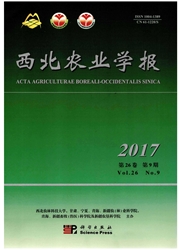

 中文摘要:
中文摘要:
从腐烂枯叶及附近土壤筛选到纤维素分解菌并研究其酶学特性。采用改进的赫奇逊分离法筛选纤维素分解菌。结果表明,共分离得到两株产纤维素酶的菌株。经菌落形态观察,初步鉴定一株为真菌(F-1),另一株为细菌(B-1)。酶学性质初步研究显示,这两株菌的纤维素酶在酸性条件下具有较高的酶活(真菌F-1最适pH为5.5,细菌B-1最适pH为4.5),酶最适反应温度分别为45℃和35℃,且真菌纤维素酶的耐热性较强;Ca2+对酶反应有抑制作用。如该纤维素酶通过生物酶工程进行工业化生产改造,那么在环境净化方面,尤其是酸性环境下的废物处理中,将会具有很大的应用价值。
 英文摘要:
英文摘要:
Cellulose-decomposing strains were obtained from decayed leaves and neighboring soil, their enzymatic properties were further studied. Two cellulose-decomposing strains were isolated by the method of improved Hutchinson Medium. They were identified as fungus (F-1) and bacteria (B-I) based on colony morphology. The optimal pH value for the enzymatic reaction was 5.5 for F-1 and 4.5 for B-1. The suitable reaction temperature was 45 ℃ for F-land 35 ℃ for B-1. F-1 had higher heat tolerance than B-1. Ca2+ was an inhibitor of the enzymatic reaction. If the cellulase improved by enzyme engineering technology,they have a great application value in the environmental purification, especially waste disposal in the acid condition.
 同期刊论文项目
同期刊论文项目
 同项目期刊论文
同项目期刊论文
 Electrophoretic Deposition of Multi-walled Carbon Nanotube on a Stainless Steel Electrode for use in
Electrophoretic Deposition of Multi-walled Carbon Nanotube on a Stainless Steel Electrode for use in Construction and Operation of Microbial Fuel Cell with Chlorella vulgaris Biocathode for Electricity
Construction and Operation of Microbial Fuel Cell with Chlorella vulgaris Biocathode for Electricity Effect of carbon nanotube modified cathode by electrophoretic deposition method on the performance o
Effect of carbon nanotube modified cathode by electrophoretic deposition method on the performance o Effect of different acclimation methods on the performance of microbial fuel cells using phenol as s
Effect of different acclimation methods on the performance of microbial fuel cells using phenol as s Effects of the presence of sheet iron in freshwater sediment on the performance of a sediment microb
Effects of the presence of sheet iron in freshwater sediment on the performance of a sediment microb 期刊信息
期刊信息
